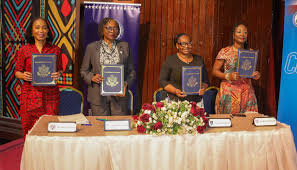In a move to strengthen educational ties between the United States and Nigeria, Spelman College, a prestigious institution known for educating women of African descent, has entered into an agreement with three universities in Lagos. This collaboration, announced on July 26, 2024, marks a new chapter in the 50-year Sister Cities partnership between Lagos and Atlanta.

The agreement involves the University of Lagos, Lagos State University, and Pan-Atlantic University, representing a diverse cross-section of higher education institutions in Nigeria’s largest city. Dr. Helene Gayle, President of Spelman College and a member of the US President’s Advisory Council on African Diaspora Engagement, signed the agreement at the University of Lagos.
This partnership aims to enhance educational opportunities, particularly for women, and foster stronger academic ties between the two countries. It aligns with the US government’s commitment to promoting access to quality higher education and supporting human capital development in Nigeria.
US Consul General Will Stevens emphasized the importance of such initiatives in strengthening Nigeria’s educational system and providing students with opportunities for quality education throughout the country. The collaboration is expected to facilitate student and faculty exchanges, joint research projects, and shared academic resources.
One key aspect of this partnership is its potential impact on women’s education. Spelman College, with its rich history of empowering women of African descent, brings valuable expertise to this collaboration. This focus on women’s education could help address gender disparities in higher education and contribute to the overall development of Nigeria’s human capital.
The agreement also builds on existing educational exchange programs between the US and Nigeria, such as the Fulbright program. These programs have already provided numerous Nigerian students and faculty members with opportunities to engage in collaborative research at US institutions across various academic disciplines.
Professor Folasade Ogunsola, Vice Chancellor of the University of Lagos, hailed the partnership as a historic event, marking the beginning of a new era in US-Nigeria educational collaboration. This sentiment reflects the high expectations and potential long-term impact of this agreement on Nigeria’s higher education landscape.
While this partnership represents a positive step, it’s important to consider the broader context of education in Nigeria. The country faces significant challenges in its education sector, including inadequate funding, infrastructure deficits, and brain drain. This new collaboration, while valuable, is just one piece of a larger puzzle in addressing these systemic issues.
Moreover, the focus on partnering with universities in Lagos, while understandable given the Sister Cities relationship, raises questions about educational equity across Nigeria. Future initiatives might consider expanding such partnerships to institutions in other regions of the country to ensure a more widespread impact.
The success of this partnership will likely depend on sustained commitment from all parties involved, as well as the ability to translate the agreement into tangible benefits for students and faculty members. It will be crucial to monitor the implementation of exchange programs, research collaborations, and other initiatives resulting from this agreement.
As Nigeria continues to play a significant role in Africa’s economic and social development, partnerships like this could contribute to building a stronger, more globally connected higher education system. The involvement of institutions like Spelman College, with its focus on empowering women of African descent, could also help address gender disparities in higher education and professional fields.
This US-Nigeria educational partnership represents a promising step towards enhancing academic opportunities and fostering international collaboration. As it unfolds, it will be interesting to see how this initiative contributes to the broader goals of improving education quality, promoting gender equality in academia, and strengthening the ties between the United States and Nigeria.



